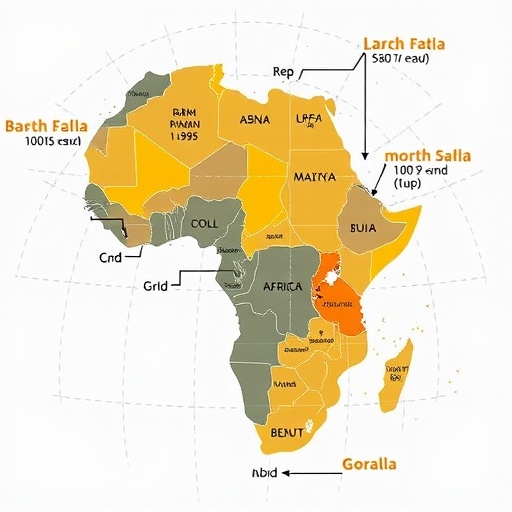Exploring Systems Analysis and Interdisciplinary Research Approaches for Sustainable Development in Africa
The quest for sustainable development has become an urgent global priority, particularly in regions like Africa, where the challenges of poverty, climate change, and resource depletion are most pronounced. Recent findings gathered by a collaborative research team led by Nedungadi, Onyancha, and Filho provide a comprehensive analysis initiative that seeks to foster innovation in sustainable practices across the continent. The research focuses on leveraging systems analysis alongside interdisciplinary research approaches to create robust frameworks for addressing the multifaceted nature of sustainable development challenges.
One of the integral aspects of this research is the clear recognition of the complexity surrounding sustainable development. Africa is a kaleidoscope of ecosystems, cultures, and economies, each with unique problems and potential solutions. This diversity necessitates a broad analytical lens, one that can accommodate the intricacies of socio-economic interactions and environmental dynamics. Systems analysis emerges as a vital tool in this context, providing a structured methodology for understanding how different components of society interact and influence sustainability outcomes.
Systems analysis offers a sophisticated framework that enables researchers and practitioners to visualize interdependencies in ecological, social, and economic systems. By mapping these constituencies, the research team can identify leverage points where targeted interventions could yield significant improvements in sustainability practices. This interconnected approach moves beyond traditional linear thinking, encouraging stakeholders to consider the broader impacts of their decisions within the larger system.
This interdisciplinary research approach emphasizes collaboration among various academic disciplines. In addressing the sustainability crisis, economists, ecologists, sociologists, and technologists must converge, sharing insights that contribute to a more holistic understanding of the problems at hand. The team advocates for breaking down silos that often exist between disciplines, fostering an integrated effort that can promote innovation and actionable solutions. By merging diverse expertise, researchers can develop frameworks that are not only scientifically sound but also culturally and socially relevant to the differing contexts across Africa.
Moreover, the initiative underscores the importance of local knowledge and indigenous practices in achieving sustainable outcomes. By incorporating these perspectives, researchers can create more inclusive strategies that resonate with the communities they aim to serve. Engaging with local populations enables a deeper understanding of their needs and values, which is essential for developing sustainable solutions that are both effective and ethically grounded. This approach promotes respect for local cultures and traditions, ensuring that interventions do not undermine existing systems but rather enhance and empower them.
One compelling aspect of the research is its focus on practical applications of systems analysis. By illustrating case studies from various African countries, the authors provide real-world examples of how this methodology can inform policy-making and development strategies. These examples range from renewable energy projects that leverage local resources to sustainable agricultural practices that improve food security, demonstrating that systems analysis can provide actionable insights that address immediate sustainability challenges.
Furthermore, the findings suggest that interdisciplinary research can facilitate the development of innovative technologies that are tailored to local conditions. For instance, technological advancements in renewable energy can be better designed when informed by an understanding of local socio-economic realities. This synchronicity between technological development and socio-cultural contexts can augment the effectiveness of these innovations while ensuring their acceptance and sustainability within communities.
However, the success of implementing these systems analysis and interdisciplinary approaches relies heavily on the availability of reliable data. The research team highlights the current gaps in data collection and analysis, which can hinder effective decision-making. To address this limitation, there is a need for coordinated efforts to establish comprehensive data systems that can be utilized across disciplines and stakeholders. By fostering partnerships between governmental bodies, non-governmental organizations, and academic institutions, researchers can enhance the quality and accessibility of data essential for informing sustainable development strategies.
The urgency of these findings parallels the rising global concern about climate change. Africa is particularly vulnerable to the effects of climate transition, including extreme weather events and shifting agricultural patterns. By employing systems analysis, stakeholders can evaluate the potential impacts of climate change on different sectors, helping communities adapt more effectively. The research underscores the necessity of future-proofing infrastructure and resources to withstand the challenges posed by an evolving climate, creating resilience in the face of uncertainty.
In addition, the research discusses the importance of policy frameworks that support sustainable development. The integration of systems analysis and interdisciplinary approaches into policy-making can lead to more coherent and encompassing strategies that tackle sustainability from multiple angles. Policymakers can gain a clearer understanding of the potential ripple effects of their decisions, allowing for more spherically advantageous outcomes.
As the discussion around sustainable development continues to evolve, the work of Nedungadi, Onyancha, and Filho stands as a significant contribution to the field. Their emphasis on systems analysis and interdisciplinary collaboration is poised to influence academic research, governmental policy, and grassroots initiatives alike. By fostering a culture of shared knowledge and innovation, we can pave the way for a more sustainable future for Africa and beyond.
The research findings are more than just theoretical; they serve as a blueprint for action in a continent laden with challenges yet rich in potential. It is through the confluence of diverse disciplines and robust analytical frameworks that Africa can craft solutions that not only address sustainability issues but also build a foundation for long-term economic and social vitality. Ultimately, these insights form a crucial part of the conversation about the future of sustainable development, highlighting the urgency of collaboration, innovation, and inclusive practices.
Subject of Research: Sustainable Development in Africa
Article Title: Exploring systems analysis and interdisciplinary research approaches for sustainable development in Africa
Article References: Nedungadi, P., Onyancha, O.B., Filho, W.L. et al. Exploring systems analysis and interdisciplinary research approaches for sustainable development in Africa. Discov Sustain 6, 885 (2025). https://doi.org/10.1007/s43621-025-01792-8
Image Credits: AI Generated
DOI:
Keywords: Sustainable Development, Systems Analysis, Interdisciplinary Research, Africa, Environmental Challenges, Local Knowledge, Climate Change.




